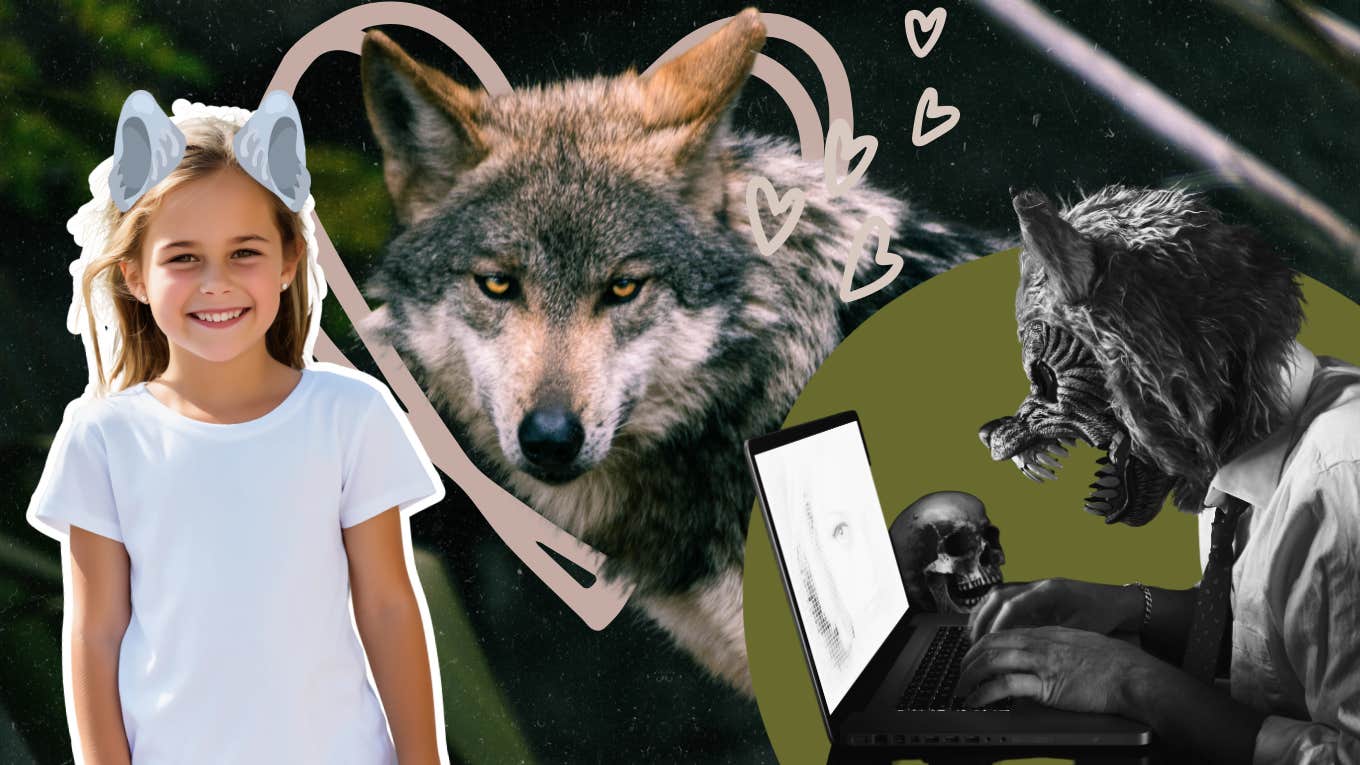How Undiagnosed ADHD Made Me Vulnerable To Predatory Grooming
How intersectional feminism is crucial to child protection.
 Anthony Sebbo | Unsplash, tuty desain | Canva
Anthony Sebbo | Unsplash, tuty desain | Canva Several years ago, while chaperoning a class field trip for one of my sons, I noticed one of his classmates seemed a little… different.
Maddie's* peers engaged with her, but not as frequently or in the same way as they did one another. It was as if they wanted to include her, but they weren’t sure how; for one thing, she never sought them out.
Instead, she seemed content to stick with her teacher. And she had a thing — what some neurodivergents call a ‘special interest’ — for wolves.
Maddie reminded me so much of myself at her age, the ‘weird kid’ who got along better with adults and seemed to live only partway among her class; the other part engaged with whatever imagination was spinning in her head.
I really wanted to sit with her a little more; I think neurodivergent kids need to see neurodivergent adults successfully living adult lives.
But I held back. It wouldn’t have been appropriate for me to approach Maddie, even as a fellow neurodivergent, because on that trip, I had already been assigned four kids — including my own son — to watch over.
As well, approaching her would’ve seemed, well, predatory. I knew from experience that in school society, ‘weird’ = ‘weak.’ Adding to this, I knew the quickest way to gain her trust would’ve been to ask her to tell me all about wolves.
Ultimately, my gesture would’ve been unfair to her; it wasn’t as if my own neurodivergence and I would remain in her life beyond that trip.
But that, too, was the rub: neither would her teacher. I worried what might happen to Maddie later in her teen years, when adults expect you to know how to take care of yourself; to ‘know better,’ in a sense, to be able to figure it out when you’re uncertain. I knew:
- Maddie might encounter the kind of man who would ask her to tell him about wolves, and then demand a certain kind of attention from her in kind.
- That protection from one teacher during one year of school might not be enough to teach her how to protect herself against those kinds of men.
- No matter how much she knew about wolves, discerning herself as prey might not come so easily.
- Because she was verbal and in a mainstream classroom, Maddie too might be expected to ‘know better’ in interactions with those kinds of men, no matter how naive she was.
Projection, of course. Maddie, my son later told me, had an Autism Spectrum diagnosis; I’d grown up without my ADHD being identified. The adults in my life had expectations that didn’t fit my neurotype; the adults in hers seemed able to adapt.
Thus, I needed to trust the adults in her life as much as I had been entrusted with the four kids in my own care. But that’s a tall order when you know the adults in your life ‘did their best’ and you still ended up targeted by predators.
I believed my traits were character flaws.
By the time I entered high school, my special interests — the Pacific Theater of World War II, for one, and Star Trek, for another — had faded into career planning and the activities that would support it.
Told for much of my life that I needed more discipline, in ninth grade I joined my school’s Air Force Junior Reserve Officer Training Corps (JROTC). Two years later, struggling to fit in even with the other JROTC cadets, I joined my local police department’s Explorer program.
Both programs have received press in recent years about their lack of oversight and the ready-made supply of vulnerable kids to predatory men.
I want to be clear that probably 98 percent of the men in my life at that time had no such aims. The JROTC instructors in my high school were kind, decent, highly principled men who maintained appropriate boundaries and honored us as people in our own right.
Nonetheless, I didn’t approach them when the two predators I did encounter — at a week-long JROTC summer camp designed to mimic basic training — made their moves.
By then, I believed that I, with my inability to conform, was in the wrong for ‘inviting’ inappropriate attention. Because I was mainly focused on just getting something right in life, I didn’t want to invite the suspicion that I couldn’t manage.
Joining Explorers was an effort to double down and find ‘my’ people, but here again, it seemed like I was chastised almost constantly for one mistake or another. The program was poorly organized, and most of the cops were too caught up in their own personal and professional dramas to bother much with ours.
Their major concern was the extent to which we did or didn’t open the department to liabilities.
So, when one of the field training officers (FTO) stepped up to become our formal post advisor, it felt like everyone breathed a sigh of relief.
That was part of the problem. Adults who aren’t thinking about kids’ vulnerabilities — who are happy to let kids be someone else’s problem — can miss the signs that other adults think a little too much about kids.
Thus, nary an eyelash was batted when this FTO took us on solo as well as group outings. Standard FTO advice like “Keep your eyes and ears open, and your mouth shut,” which sounded fair to kids who knew nothing about police work, also became a handy fallback to tamp down discomfort — to override my own internal guidance.
Unable to trust myself, I’d further learned not to trust most adults — including (maybe even especially) adult women — after too many experiences being scoffed at, ignored, or even punished for speaking up.
After all, these adults were taking time out of their own busy lives to encourage our career-building, and indeed, being singled out for positive attention felt amazing.
More than simple praise, child predators are good at camouflage. Perhaps it’s because of their own ‘weirdness’ that they know how to make an ADHD kid feel understood. Special. Finally, you are able to live up to the ‘potential’ all the other adults shame you for not quite reaching.
The only problem is they see a different ‘potential’ for you than you’d ever want: one that serves only them.
I was lucky, in a sense, that my hypersensitivity to being perceived as ‘in the wrong’ did give me back the gut sense I needed to discern when situations felt ‘off.’
Although none of those situations progressed past grooming, they did leave lasting marks on my ability to trust; to discern healthy from unhealthy interest, for one. For another, living under the weight of this shame kept me from reaching out for guidance across many situations, both personal and professional.
There is no inclusivity without intersectionality.
One stark contrast between Maddie’s experience and mine growing up was that, as far as I could tell, Maddie seemed to accept that she deserved her teacher’s protectiveness in a way I never did.
Female teachers had communicated their emotional availability to me in ways I could never quite bring myself to trust, not because they felt ‘off,’ but because I wondered where the ‘catch’ was. On some level, I believed they couldn’t possibly know me very well, because if they did, they’d never put up with me — or, worse, would turn on me.
 Photo: PeopleImages.com - Yuri A / Shutterstock
Photo: PeopleImages.com - Yuri A / Shutterstock
I now understand that these teachers (and one dispatcher) instinctively understood the adage that it takes a village to raise a child. But the child has to be certain the village has their back.
Nowadays, Western society is a lot better at two crucial things: diagnosing neurodivergence, and educating kids about predatory behavior. Knowledge is power, after all.
Yet these efforts can still fall short. Neurodivergence looks different in girls and women than in boys and men. Meanwhile, much predator education seems to continue to focus on ‘stranger danger’ (especially online) rather than acknowledging that predators already stalk among us — not just wearing our clothes, but also sounding and acting like caring, responsible leaders.
Often, these are the very leaders who prey on girls and young women, who, from young ages, are socialized to shoulder blame for their neurodivergent ‘unladylike’ or ‘high maintenance’ or ‘willful’ traits.
These traumatized children grow up to be traumatized adults, with mental and medical disorders that make it challenging, if not impossible, for them to realize their full potential in society. In short, it’s not the traits themselves that stifle our potential; it’s unrealistic, often gendered, and/or racialized neurotypical expectations.
With the power of knowledge comes responsibility. Thus, doing better with our ‘weird’ kids means educating ourselves. More than simply inviting them to play or showing them interesting things in an effort to engage them, we can understand:
- The intersectionality of, say, female and neurodiverse and understanding how neurodiversity might present or be interpreted in girls and boys across different racial, ethnic, and cultural demographics.
- That a diagnosis or self-identification offers important information that a child or adult needs to move forward and thrive in life.
- How teachers, support staff, and parent volunteers can help to educate kids about the cultural, neurotype, and speech-language differences that might make another child seem ‘weird’, and how to be more inclusive of them.
- How to place less stock in title or status, but instead encourage everyone to use their eyes, ears, and hearts to discern how a leader or authority figure makes them feel.
- How to trust and encourage kids to know and communicate what feels right, and wrong, for themselves.
Myriad other ways exist to strengthen the weak and diminish the shadows in which child predators and their enablers hunt.
The key is what we do when we notice the ‘weird kid’ in our spheres: leave them to fend for themselves.
Or, knowing they may not have equal access to diagnosis, information, or caring adults, step up and be their guide in ways that serve them.
*Name has been changed
Christa Miller has been a professional writer for 20+ years, publishing works in niche trade, nonprofit, and regional lifestyle articles, content marketing, journalism, peer-reviewed research, and fiction for both children and adults.
